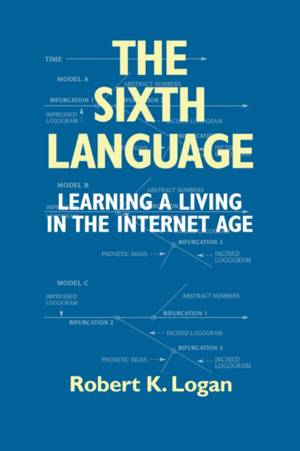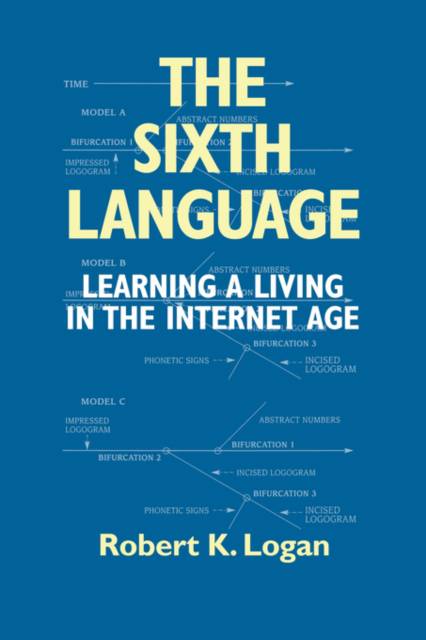
- Afhalen na 1 uur in een winkel met voorraad
- Gratis thuislevering in België vanaf € 30
- Ruim aanbod met 7 miljoen producten
- Afhalen na 1 uur in een winkel met voorraad
- Gratis thuislevering in België vanaf € 30
- Ruim aanbod met 7 miljoen producten
Zoeken
The Sixth Language
Learning a Living in the Internet Age, Second Edition
Robert K Logan
Paperback | Engels
€ 58,45
+ 116 punten
Omschrijving
The first edition of the Sixth Language, published in 2000, was a recipient of the Susanne K. Langer Prize of the Media Ecology Association for Outstanding Scholarship in the Ecology of Symbolic Form. This second edition includes 37 new pages in a new Foreword and Afterword where Logan reports on a number of new developments in his research into the origin and evolution of language. The Sixth Language updates the work of Marshall McLuhan by applying his ideas to the communications revolution taking place due to digital information technology. Logan's work interweaves ideas which touch on language, education, work, social class, information technology and management theory. He establishes the theoretical background for his study with a succinct and very readable summary of McLuhan's ideas. Logan develops a new theory of language by showing that a language is not merely a system of communication but also an information processing tool. He goes on to show that speech, writing, mathematics, science, computing and the Internet form an evolutionary chain of verbal languages. As Logan weaves his tale of the development of language he also shows how new educational, social, political and economic institutions arise. Turning to education Logan shows how the evolution of language led to the evolution of education. He explains that the reason our schools are so out of touch is that they are Industrial Age institutions trying desperately to meet the needs of the Internet Age and the Knowledge Era. He suggests a radical new way of remedying the malaise of education by proposing that the core curriculum focus on the generic skills associated with the use of the six languages of speech, writing, math, science, computing and the Internet. He contends that the actual content of the curriculum, the topics that are studied are not important and should be chosen to cater to the students' interests. Once students have mastered the six languages they are then in a position to learn whatever topics or material they require for their work or their personal interest. Logan proposes an equally radical rethinking of training and education in the work place. Logan closes his book with a chapter on the Internet in which he shows how this medium recaptures the spirit of oral culture. He demonstrates that the new level of connectivity requires more than the mere re-engineering of business processes such as marketing, advertising, sales, customer support, and market research. According to Logan, it requires an actual alignment of these processes because of the way in which they are integrated by the Internet. "Logan was a young colleague of Marshall McLuhan at the University of Toronto and brings a richness of linkage between McLuhan's vision and its fruition in the internet age. While the book gives many practical overviews, it is more a book of comprehension than of instruction. The internet age is upon us, but many firms are not at the point of understanding "learning a living" as a concept." an Amazon reviewer Dr. Logan is an alumnus of MIT and currently teaches at the University of Toronto where he is a member of the Physics Department and is cross-appointed to the Ontario Institute for Studies in Education and the McLuhan Program in Cultural Technology. He served as an advisor to Prime Minister Pierre Trudeau and has authored studies for the Ontario Ministry of Education, the federal Department of Communications, the Science Council of Canada, and the federal Ministry of State for Science and Technology.
Specificaties
Betrokkenen
- Auteur(s):
- Uitgeverij:
Inhoud
- Aantal bladzijden:
- 360
- Taal:
- Engels
Eigenschappen
- Productcode (EAN):
- 9781930665996
- Verschijningsdatum:
- 1/07/2004
- Uitvoering:
- Paperback
- Formaat:
- Trade paperback (VS)
- Afmetingen:
- 152 mm x 229 mm
- Gewicht:
- 480 g

Alleen bij Standaard Boekhandel
+ 116 punten op je klantenkaart van Standaard Boekhandel
Beoordelingen
We publiceren alleen reviews die voldoen aan de voorwaarden voor reviews. Bekijk onze voorwaarden voor reviews.







